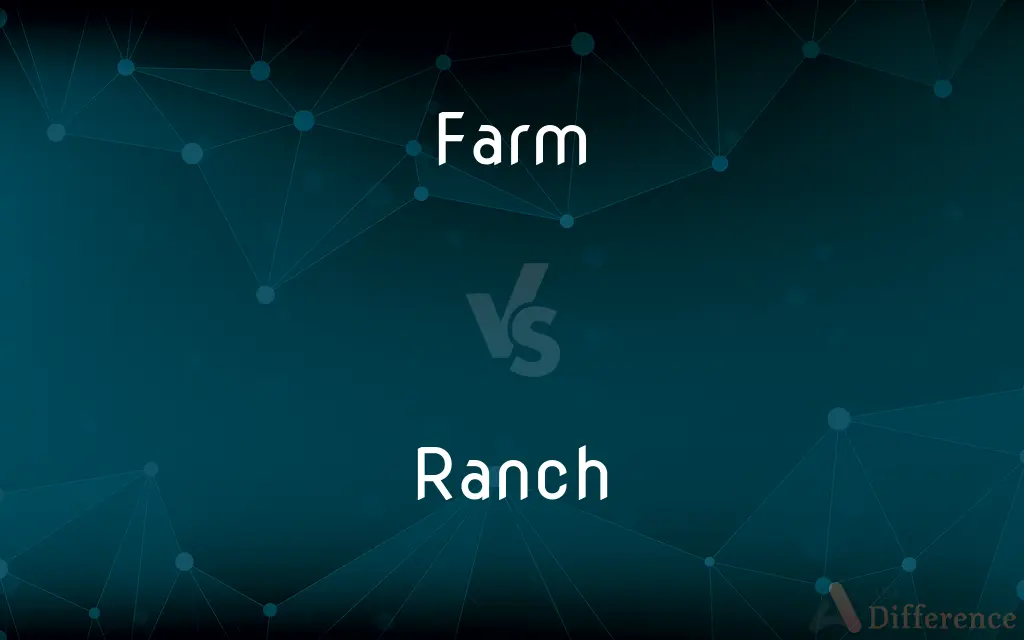Farm vs. Ranch — What's the Difference?
By Tayyaba Rehman — Updated on September 27, 2023
A "Farm" typically refers to land devoted to agriculture and the production of food, involving both crops and livestock. A "Ranch," however, usually refers to a large area of land primarily focused on raising livestock, especially cattle.

Difference Between Farm and Ranch
Table of Contents
ADVERTISEMENT
Key Differences
The terms "Farm" and "Ranch" both refer to parcels of land but are typically used to describe different types of agricultural endeavors. A farm is generally a piece of land used for growing crops and may also involve raising livestock. It is typically characterized by a diversified approach to agriculture, incorporating various types of crops and possibly different species of animals, and is driven by the goal of food production. A ranch, conversely, is usually much larger and predominantly involves the raising of livestock, primarily cattle, often for meat production, and may involve extensive grazing areas.
The operational structures of farms and ranches differ significantly. Farms usually require meticulous planning, involving crop rotation, irrigation, and pest control, and often necessitate a more hands-on, labor-intensive approach. Ranches, with their focus on livestock, involve management practices related to animal husbandry, such as breeding, grazing management, and veterinary care, often requiring extensive land areas to accommodate the grazing needs of the livestock.
The economic models of farms and ranches are also distinct. Farms generate income from the sale of crops and possibly livestock, with revenue streams often being seasonal and dependent on market prices for agricultural produce. Ranches derive income predominantly from livestock, particularly the sale of meat and other by-products, with economic success dependent on livestock health, market demand for meat, and sometimes land management for grazing.
Geographically, the terms farm and ranch may imply different locales and environments. Farms are ubiquitous, found in various regions, climates, and countries, and can be small family-owned entities or large commercial operations. Ranches are often associated with specific regions, such as the western United States, where the landscape and climate are conducive to extensive livestock grazing, and they typically denote large, expansive land areas.
Comparison Chart
Primary Focus
Growing crops and may also involve livestock.
Raising livestock, primarily cattle.
ADVERTISEMENT
Operational Structure
Requires meticulous planning and is often labor-intensive.
Focuses on animal husbandry and grazing management.
Economic Model
Income from the sale of crops and livestock, often seasonal.
Income predominantly from livestock and related by-products.
Geographical Implication
Found ubiquitously in various climates and regions.
Often associated with specific regions conducive to grazing.
Scale and Diversity
Can be small or large and typically diversified in agricultural produce.
Usually expansive with a primary focus on a specific livestock.
Compare with Definitions
Farm
A farm (also called an agricultural holding) is an area of land that is devoted primarily to agricultural processes with the primary objective of producing food and other crops; it is the basic facility in food production. The name is used for specialized units such as arable farms, vegetable farms, fruit farms, dairy, pig and poultry farms, and land used for the production of natural fiber, biofuel and other commodities.
Ranch
A Ranch is a large area of land primarily focused on raising livestock.
The ranch is home to hundreds of cattle that graze the vast fields.
Farm
An area of land and its buildings, used for growing crops and rearing animals
A farm of 100 acres
Farm workers
Ranch
A Ranch is usually associated with extensive, open areas conducive to grazing.
The ranch, with its sprawling landscapes, is ideal for cattle rearing.
Farm
Make one's living by growing crops or keeping livestock
He has farmed organically for years
Ranch
A Ranch typically focuses on animal husbandry and related activities.
Managing the ranch involves overseeing the health and breeding of the livestock.
Farm
Send out or subcontract work to others
It saves time and money to farm out some writing work to specialized companies
Ranch
A Ranch often implies specific geographic locales, like the western United States.
The ranch, located in a region known for cattle rearing, is renowned for its quality meat.
Farm
Allow someone to collect and keep the revenues from (a tax) on payment of a fee
The customs had been farmed to the collector for a fixed sum
Ranch
A ranch (from Spanish: rancho) is an area of land, including various structures, given primarily to ranching, the practice of raising grazing livestock such as cattle and sheep. It is a subtype of a farm.
Farm
A tract of land cultivated for the purpose of agricultural production.
Ranch
An extensive farm, especially in the western United States, on which large herds of cattle, sheep, or horses are raised.
Farm
A tract of land devoted to the raising and breeding of domestic animals.
Ranch
A large farm on which a particular crop or kind of animal is raised
A mink ranch.
Farm
An area of water devoted to the raising, breeding, or production of a specific aquatic animal
A trout farm.
An oyster farm.
Ranch
The building on a ranch occupied by its operator; a ranch house.
Farm
A facility for the generation of energy by converting it from a particular source, usually by means of multiple electric generators
A wind farm.
Ranch
A one-story house, usually having a low-pitched roof; a ranch house.
Farm
A place where a group of similar devices or storage containers are set up
A tank farm.
A server farm.
Ranch
To manage or work on a ranch.
Farm
(Baseball) A minor-league club affiliated with a major-league club for the training of recruits and the maintenance of temporarily unneeded players.
Ranch
A large plot of land used for raising cattle, sheep or other livestock.
Farm
The system of leasing out the rights of collecting and retaining taxes in a certain district.
Ranch
A small farm that cultivates vegetables and/or livestock, especially one in the Southwestern United States.
Farm
A district so leased.
Ranch
A house or property on a plot of ranch land.
Farm
To cultivate or produce a crop on (land).
Ranch
(uncountable) Ranch dressing.
Farm
To cultivate, breed, or raise (plants or animals).
Ranch
To operate a ranch; to engage in ranching.
Formally the widow still ranches, but in fact she leaves all ranching to the foreman.
Farm
To pay a fixed sum in order to have the right to collect and retain profits from (a business, for example).
Ranch
To work on a ranch.
Bill had ranched only five years when his dad made him foreman.
Farm
To turn over (a business, for example) to another in return for the payment of a fixed sum.
Ranch
To wrench; to tear; to sprain; to injure by violent straining or contortion.
Farm
To engage in farming.
Ranch
A tract of land used for grazing and the rearing of horses, cattle, or sheep. See Rancho, 2.
Farm
A place where agricultural and similar activities take place, especially the growing of crops or the raising of livestock.
Ranch
Farm consisting of a large tract of land along with facilities needed to raise livestock (especially cattle)
Farm
A tract of land held on lease for the purpose of cultivation.
Ranch
Manage or run a ranch;
Her husband is ranching in Arizona
Farm
A location used for an industrial purpose, having many similar structures.
Antenna farm; fuel farm; solar farm; wind farm
Ranch
A Ranch’s income is predominantly derived from livestock and their by-products.
The ranch generates revenue through the sale of meat and dairy products.
Farm
(computing) A group of coordinated servers.
A render farm
A server farm
Farm
(obsolete) Food; provisions; a meal.
Farm
(obsolete) A banquet; feast.
Farm
(obsolete) A fixed yearly amount (food, provisions, money, etc.) payable as rent or tax.
Farm
(historical) A fixed yearly sum accepted from a person as a composition for taxes or other moneys which he is empowered to collect; also, a fixed charge imposed on a town, county, etc., in respect of a tax or taxes to be collected within its limits.
Farm
(historical) The letting-out of public revenue to a ‘farmer’; the privilege of farming a tax or taxes.
Farm
The body of farmers of public revenues.
Farm
The condition of being let at a fixed rent; lease; a lease.
Farm
(historical) A baby farm.
Farm
(intransitive) To work on a farm, especially in the growing and harvesting of crops.
Farm
(transitive) To devote (land) to farming.
Farm
(transitive) To grow (a particular crop).
Farm
To give up to another, as an estate, a business, the revenue, etc., on condition of receiving in return a percentage of what it yields; to farm out.
To farm the taxes
Farm
To lease or let for an equivalent, e.g. land for a rent; to yield the use of to proceeds.
Farm
To take at a certain rent or rate.
Farm
To engage in grinding (repetitive activity) in a particular area or against specific enemies for a particular drop or item.
Farm
To cleanse; clean out; put in order; empty; empty out
Farm out the stable and pigsty.
Farm
The rent of land, - originally paid by reservation of part of its products.
Farm
The term or tenure of a lease of land for cultivation; a leasehold.
It is great willfulness in landlords to make any longer farms to their tenants.
Farm
The land held under lease and by payment of rent for the purpose of cultivation.
Farm
Any tract of land devoted to agricultural purposes, under the management of a tenant or the owner.
Farm
A district of country leased (or farmed) out for the collection of the revenues of government.
The province was devided into twelve farms.
Farm
A lease of the imposts on particular goods; as, the sugar farm, the silk farm.
Whereas G. H. held the farm of sugars upon a rent of 10,000 marks per annum.
Farm
To lease or let for an equivalent, as land for a rent; to yield the use of to proceeds.
We are enforced to farm our royal realm.
Farm
To give up to another, as an estate, a business, the revenue, etc., on condition of receiving in return a percentage of what it yields; as, to farm the taxes.
To farm their subjects and their duties toward these.
Farm
To take at a certain rent or rate.
Farm
To devote (land) to agriculture; to cultivate, as land; to till, as a farm.
Farm
To engage in the business of tilling the soil; to labor as a farmer.
Farm
Workplace consisting of farm buildings and cultivated land as a unit;
It takes several people to work the farm
Farm
Be a farmer; work as a farmer;
My son is farming in California
Farm
Collect fees or profits
Farm
Cultivate by growing, often involving improvements by means of agricultural techniques;
The Bordeaux region produces great red wines
They produce good ham in Parma
We grow wheat here
We raise hogs here
Farm
A Farm is a land area used for growing crops and raising animals.
The farm produces a variety of vegetables and also has a poultry section.
Farm
A Farm is characterized by agricultural diversity and food production.
The farm grows several types of grains and houses dairy cattle.
Farm
A Farm typically requires meticulous planning and regular attention.
Managing the farm involves careful selection of crops and diligent care.
Farm
A Farm can be a small family-run entity or a large commercial operation.
The family has owned the farm for generations, maintaining its traditional values.
Farm
A Farm's revenue is often seasonal, dependent on crop cycles and market prices.
The farm's income peaks during the harvest season when the produce is sold.
Common Curiosities
Is a ranch primarily focused on raising livestock?
Yes, ranches are primarily focused on raising livestock, especially cattle.
Is a farm typically smaller and more diversified than a ranch?
Yes, farms are typically smaller and more diversified in terms of agricultural produce compared to ranches.
Is a farm’s revenue often seasonal and dependent on market prices for agricultural produce?
Yes, farms often have seasonal revenue, which is dependent on crop cycles and the prevailing market prices for agricultural produce.
Is the income from a ranch mostly derived from livestock and related by-products?
Yes, the income of a ranch is predominantly derived from livestock and their by-products, like meat and dairy.
Can a farm be found in various geographic locations and climates?
Absolutely, farms can be found in a variety of geographic locations and climates, producing a range of agricultural products.
Are ranches typically associated with specific regions conducive to livestock grazing?
Yes, ranches are often located in specific regions where the landscape and climate are conducive to extensive livestock grazing.
Is meticulous planning and regular attention typically required for managing a farm?
Yes, managing a farm typically requires meticulous planning, regular attention, and often involves labor-intensive work.
Can a farm also involve the raising of livestock along with growing crops?
Absolutely, many farms raise livestock in addition to growing crops, contributing to agricultural diversity.
Can a ranch be expansive and primarily focus on a specific type of livestock?
Yes, ranches are usually expansive and often primarily focus on raising a specific type of livestock, like cattle.
Are the operational structures of farms typically more labor-intensive compared to ranches?
Yes, farms often require more labor-intensive operational structures, involving crop rotation, irrigation, and pest control, compared to the animal-focused operations of ranches.
Is managing a ranch typically focused on animal husbandry and grazing management?
Yes, managing a ranch typically involves focusing on animal husbandry, grazing management, and maintaining the health of the livestock.
Do farms typically produce a variety of agricultural products, including food crops?
Yes, farms typically produce a variety of agricultural products and are primarily focused on food production, involving both crops and sometimes livestock.
Share Your Discovery

Previous Comparison
Ecologic vs. Ecological
Next Comparison
Archetypical vs. ArchetypalAuthor Spotlight
Written by
Tayyaba RehmanTayyaba Rehman is a distinguished writer, currently serving as a primary contributor to askdifference.com. As a researcher in semantics and etymology, Tayyaba's passion for the complexity of languages and their distinctions has found a perfect home on the platform. Tayyaba delves into the intricacies of language, distinguishing between commonly confused words and phrases, thereby providing clarity for readers worldwide.
















































